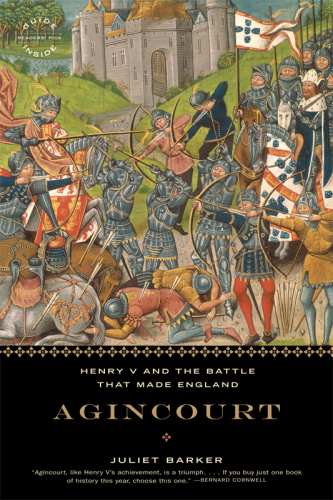
Agincourt
Henry V and the Battle That Made England
کتاب های مرتبط
- اطلاعات
- نقد و بررسی
- دیدگاه کاربران
نقد و بررسی

Starred review from April 17, 2006
Barker, a British biographer (The Brontës
) and accomplished medievalist, brings an excellent synergy of academic and literary skills to this study of the 1415 British campaign in France and the battle that was its climax, around which she elaborately reconstructs the conflict's antecedents. Henry V spent years preparing the ground: asserting initially shaky authority in England, exploiting domestic strife in France and isolating the disorganized kingdom from its traditional allies. During the campaign itself, a train of artillery manned by foreign gunners supplemented the men-at-arms and the longbowmen, who were the British army's real backbone. But the French were not the vainglorious incompetents of English legend and Shakespearean drama. Many in northern France made a brave effort, often putting aside personal and political differences to stand together at Agincourt, where they came closer to success than is generally realized. Barker shows that the battle hung by a thread: French numbers against English desperation, with courage a common virtue. She also illustrates how Agincourt was decisive—not only for its consequences in France. An English defeat would have meant chaos, perhaps civil war. Destiny on both sides of the Channel turned on the outcome of St. Crispin's Day.

June 1, 2006
October 25, 1415, St. Crispin -s Day. Several thousand exhausted and diseased English soldiers, along with many nobles and King Henry V himself, were desperately trying to get to the safety of Calais when they came up against a far greater number of French forces, who were well rested and well fed. Miraculously, the English not only won the ensuing battle of Agincourt but destroyed most of France -s nobility, almost all of whom were in the French forces. Barker ("Wordsworth: A Life"), a medievalist by training, here tackles one of the most significant battles of the Middle Ages. Beginning with Henry -s training in the Welsh wars, Barker weaves a gripping narrative of the events that led to his invasion of France in August 1415, the long siege of Harfleur that followed, and the Battle of Agincourt and its aftermath. Along the way, she discusses controversies about the sizes of the respective armies and the effectiveness of the new longbow. Discarding the myths that have surrounded the battle, she gives a true feeling of the stress and exhaustion of this harrowing campaign, immortalized by Shakespeare. The truth of Agincourt is still being sought by scholars and is every bit as engrossing as the myth. Ann Curry -s recent "Agincourt: A New History "concludes that the opposing forces were more evenly matched in numbers. Both Barker and Curry have written worthy volumes for any library. If a public library must choose only one, Barker -s is the more accessible to general readers." -Robert Harbison, Western Kentucky Univ. Lib., Bowling Green"
Copyright 2006 Library Journal, LLC Used with permission.

May 15, 2006
The Battle of Agincourt of 1415 has endured in popular awareness on the strength of Shakespeare's " Henry the Fifth." The historical Henry V bears scant resemblance to Falstaff's royal drinking buddy: in Barker's lushly detailed account, Henry V was a pious warrior, an able administrator, and an aggressive diplomat. Barker dwells extensively on Henry's rapid intensification, after ascending to the throne in 1413, of the Hundred Years' War, the English attempt to control the crown and territory of France. As a result, her emphasis on the organization of the campaign that culminated at Agincourt delivers a superb description of how a medieval military force was raised. Founded on feudal precepts of lord-and-vassal obligation, Henry's army and that of France were personalistic, a trait Barker turns to positive advantage in portraying the combatants. From longbow men to men-at-arms, Barker successfully individuates the Agincourt battle so that readers perceive actual people, not just a melee of thousands, engaging in the battle. With fluency and empathy, Barker delivers a superior performance that should capture avid history readers.(Reprinted with permission of Booklist, copyright 2006, American Library Association.)

























دیدگاه کاربران